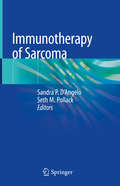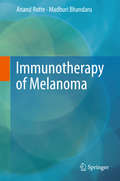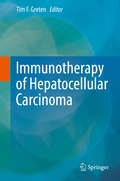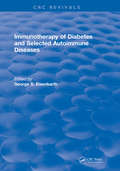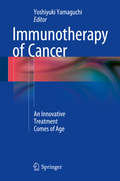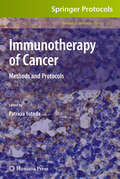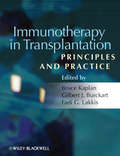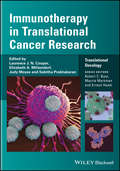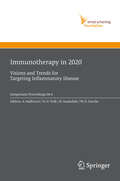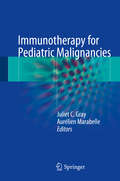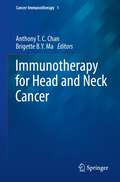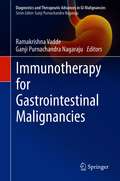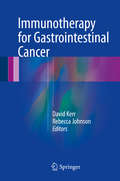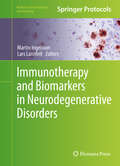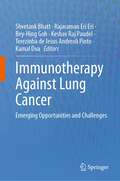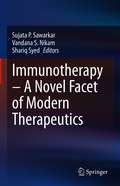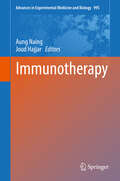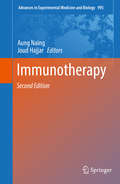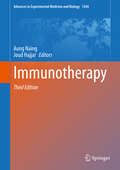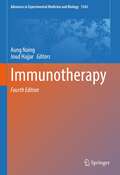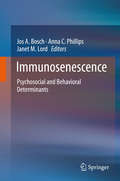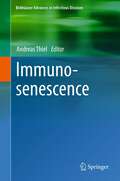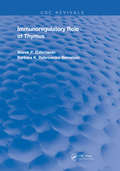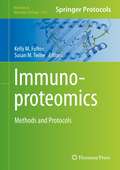- Table View
- List View
Immunotherapy of Sarcoma
by Sandra P. D'Angelo Seth M. PollackThis book describes recent progress in the development of immunotherapies for advanced sarcoma, paying special attention to the potential role of manipulations of the sarcoma tumor immune microenvironment in improving patient outcomes. Readers will find a thorough overview of the state of the art in tumor immunology and immunotherapy as they relate to sarcoma. Among the topics addressed are advances in vaccine therapy; cytokine therapies; natural killer cells; the development of adoptive T cell strategies; and the scope for use of checkpoint inhibitors in patients with sarcoma, mirroring the tremendous breakthroughs made in other malignancies. Detailed information is provided on laboratory and clinical research, with analysis of outcomes of recent trials and identification of key challenges. There is every reason to believe that more effective and less toxic therapies for metastatic sarcoma can be attained by deepening our understanding of cancer immunology and building on the advances in immunotherapy for other solid tumors. In this context, Immunotherapy of Sarcoma will be of high interest for all medical oncologists responsible for the treatment of sarcoma patients.
Immunotherapy of Melanoma
by Anand Rotte Madhuri BhandaruMetastatic melanoma are introduced to the readers, giving details of the diagnosis, clinical symptoms, types and AJCC staging, followed by a discussion of problems in the treatment of melanoma and how immunotherapy provided the solution. Next an account of the immune system is given, describing its role in cancer prevention and discussing how immune check points are circumvented in cancer. Approved drugs are discussed together with their molecular mechanisms of action, response rates, survival benefits, pharmacokinetics and adverse effects. Finally this book discusses the most promising candidates from ongoing clinical trials and highlights challenges faced by immunotherapeutic drugs as well as strategies to overcome them. Metastatic melanoma is a deadly type of skin cancer, known for its resistance to conventional treatments. For decades, patients were managed with a handful of drugs that had minimal survival benefits. The scenario changed with the approval of inhibitors of BrafV600E and MEK, and monoclonal antibodies against CTLA4. While the kinase inhibitors were promising in the initial studies, they suffered with the development of lethal resistance. Anti-CTLA4 monoclonal antibodies (Ipilimumab) on the other hand provided long term survival benefits in responding patients and there were no reports of resistance. However, response rate for Ipilimumab was very low. Recently, monoclonal antibodies against PD-1 receptors (Nivolumab, Pembrolizumab) were approved by FDA for the treatment of melanoma, extending the hope for melanoma patients. This book provides detailed information on immunotherapeutic drugs for melanoma management - it describes melanoma, discusses issues in melanoma treatment and highlights the successes of immunotherapy in the treatment.
Immunotherapy of Hepatocellular Carcinoma
by Tim F. GretenIn this book we provide insights into liver – cancer and immunology. Experts in the field provide an overview over fundamental immunological questions in liver cancer and tumorimmunology, which form the base for immune based approaches in HCC, which gain increasing interest in the community due to first promising results obtained in early clinical trials. Hepatocellular carcinoma (HCC) is the third most common cause of cancer related death in the United States. Treatment options are limited. Viral hepatitis is one of the major risk factors for HCC, which represents a typical “inflammation-induced” cancer.Immune-based treatment approaches have revolutionized oncology in recent years. Various treatment strategies have received FDA approval including dendritic cell vaccination, for prostate cancer as well as immune checkpoint inhibition targeting the CTLA4 or the PD1/PDL1 axis in melanoma, lung, and kidney cancer. Additionally, cell based therapies (adoptive T cell therapy, CAR T cells and TCR transduced T cells) have demonstrated significant efficacy in patients with B cell malignancies and melanoma. Immune checkpoint inhibitors in particular have generated enormous excitement across the entire field of oncology, providing a significant benefit to a minority of patients.
Immunotherapy of Diabetes and Selected Autoimmune Diseases: Autoimmune 8
by George S. EisenbarthThis important text will be the first devoted to a detailed analysis of immunotherapy as it applies to Type I diabetes and the pathogenesis and therapy of other specific autoimmune diseases (including uveitis, multiple sclerosis, myasthenia gravis, Cogan's syndrome, Graves' ophthalmopathy, and gonadal disorders).
Immunotherapy of Cancer
by Yoshiyuki YamaguchiThis timely book, published just as cancer immunotherapy comes of age, summarizes the rationale, present status, and future perspective for cancer immunotherapy. Included are explanations of the constitution of the immune system and immunocheckpoints, the mechanism of antigen presentation and recognition, valuable modalities, clinical trials and guidance, personalization, and biomarkers, all of which are essential for understanding the success of cancer immunotherapy. This innovative therapy has been investigated worldwide as the fourth line of cancer treatment after the standard treatments of surgery, chemotherapy, and radiotherapy. The progress in fundamental understanding of tumor immunology and the recent advances in clinical trials have opened new avenues with a cancer vaccine in 2010 and immunocheckpoint modulation in 2011, with their approval already granted in the United States. Today, there are no doubts, even among experts in cancer chemotherapy and radiotherapy, that the immune system plays a vital role in tumor eradication. Following American approval, many clinical trials of cancer immunotherapy are being conducted. With this book the reader will readily understand the paradigm shift in cancer treatment and will realize the importance of cancer immunotherapy. The great value of immunotherapy will be obvious, not only for tumor shrinkage but for prolonging patient survival.
Immunotherapy of Cancer
by Patricia YotndaA continuously evolving technique, immunotherapy for the treatment of cancers now incorporates the use of immune cells infused during bone marrow transplants as well as approaches like cell and gene therapy, while stem cell-based therapies, tissue engineering, and targeting have also contributed to the latest successes in pre-clinical immunotherapy studies. In Immunotherapy of Cancer: Methods and Protocols, expert researchers in the field describe detailed procedures for trainees and experts in the area of basic, clinical science who wish to undertake their own cutting-edge immunotherapy studies. In addition to the protocols, the volume also contains two general overviews providing useful updates in each area as well as summaries of recent pre-clinical and clinical trials. Written in the highly successful Methods in Molecular BiologyTM series format, chapters include introductions to their respective topics, lists of the necessary materials, step-by-step, readily reproducible laboratory protocols, and notes on troubleshooting and avoiding known pitfalls. Authoritative and up-to-date, Immunotherapy of Cancer: Methods and Protocols seeks to guide scientists along the path to a further developed system of immunotherapeutic treatments in order to reduce and hopefully eradicate this terrible disease.
Immunotherapy in Transplantation
by Gilbert J. Burkhart Bruce Kaplan Fadi G. LakkisThis comprehensive reference source will benefit all transplant specialists working with pharmacologic and biologic agents that modulate the immune system. Compiled by a team of world-renowned editors and contributors covering the fields of transplantation, nephrology, pharmacology, and immunology, the book covers all anti-rejection drugs according to a set template and includes the efficacy of each for specific diseases.
Immunotherapy in Translational Cancer Research
by Laurence J. Cooper Elizabeth A. Mittendorf Judy Moyes Sabitha PrabhakaranA guide to state-of-the-art cancer immunotherapy in translational cancer research A volume in the Translational Oncology series, Immunotherapy in Translational Cancer Research explores the recent developments in the role that immunotherapy plays in the treatment of a wide range of cancers. The editors present key concepts, illustrative examples, and suggest alternative strategies in order to achieve individualized targeted therapy. Comprehensive in scope, Immunotherapy in Translational Cancer Research reviews the relevant history, current state, and the future of burgeoning cancer-fighting therapies. The book also includes critical information on drug development, clinical trials, and governmental resources and regulatory issues. Each chapter is created to feature: development of the immunotherapy; challenges that have been overcome in order to scale up and undertake clinical trials; and clinical experience and application of research. This authoritative volume is edited by a team of noted experts from MD Anderson Cancer Center, the world’s foremost cancer research and care center and: Offers a comprehensive presentation of state-of-the-art cancer immunotherapy research that accelerates the pace of clinical cancer care Filled with the concepts, examples, and approaches for developing individualized therapy Explores the breath of treatments that reflect the complexity of the immune system itself Includes contributions from a panel international experts in the field of immunotherapy Designed for physicians, medical students, scientists, pharmaceutical executives, public health and public policy government leaders and community oncologists, this essential resource offers a guide to the bidirectional interaction between laboratory and clinic immunotherapy cancer research.
Immunotherapy in 2020
by Khusru Asadullah Wolf-Dietrich Döcke Andreas Radbruch Hans-Dieter VolkThis volume features contributions from participants of the ESRF symposium on Immunotherapy in 2020--Visions and Trends for Targeting Inflammatory Diseases held in Potsdam near Berlin, Germany, in October 2006. The symposium presentations covered the main mechanisms of immunoregulation.
Immunotherapy for Pediatric Malignancies
by Juliet C. Gray Aurélien MarabelleThis book provides a comprehensive overview of current immunotherapy strategies, and how these may be applicable to childhood cancers. The first part of the book reviews how the immune system recognizes cancer, and the various escape mechanisms allowing tumour growth. The importance of the tumor microenvironment and the challenges this may present to achieving effective immunotherapy are discussed. Monoclonal antibodies, cellular, cytokine and vaccine therapies are all comprehensively reviewed, with particular focus on their potential application to pediatric cancers. Practical aspects of delivering such therapies to children, likely toxicities and potential biomarkers are considered. Finally, consideration is given to how, in the longer term, such therapies may be combined with conventional therapies such as chemotherapy and radiotherapy. Edited by two distinguished pediatric oncologists with a collection of chapters from the most authoritative experts in cancer immunotherapy, this is an indispensable volume for pediatric oncologists and physicians working in childhood cancer care.
Immunotherapy for Head and Neck Cancer (Cancer Immunotherapy #1)
by Anthony T. C. Chan Brigette B. Y. MaThis book is a comprehensive summary of the literature on the scientific rationale and clinical development of immunotherapy for head and neck cancers.Head and neck cancer is a biologically diverse group of cancers that bear a common hallmark - evasion of host immune surveillance through innate or acquired mechanisms. The etiological association between the Human Papilloma virus (HPV) and some squamous head and neck cancers, the Epstein-Barr virus (EBV) and nasopharyngeal cancer has provided further impetus for evaluating immunotherapy in this group of cancers. The successful development of anti-programmed cell death protein-1 (PD-1)/ ligand (PD-L1) and CTLA-4 antibodies in solid tumours has gradually brought immunotherapy into mainstream oncological practice in recent years. Besides immune-checkpoint proteins inhibitors, other forms of immunotherapy such as vaccines, EBV or HPV-targeting therapies and cellular therapies are actively being investigated in clinical trials, either alone or in combination with other conventional treatments such as radiotherapy, chemotherapy and surgery. In clinical setting, the practicing oncologist need to be familiar with some unusual patterns of immunological response such as pseudo-progression and hyper-progression in patients with head and neck cancers who are undergoing treatment with immune-checkpoint inhibitors. Furthermore, the unique side effects of immune-checkpoint inhibitors such as autoimmune toxicities need to be recognized early and treated expediently. The development of biomarkers in predicting response to immune-checkpoint inhibitors has played pivotal roles in selecting patients for immunotherapy in practice or as an enrichment strategy in clinical trials. There are now emerging data on the clinical utility of biomarkers such as PD-L1 expression (Combined Positive Score), gene signatures and tumor mutational burden. This book is an invaluable companion to all those who are involved in research and clinical management of patients with head and neck cancers from any endemic regions.
Immunotherapy for Gastrointestinal Malignancies (Diagnostics and Therapeutic Advances in GI Malignancies)
by Ramakrishna Vadde Ganji Purnachandra NagarajuThis book reviews current immunotherapeutic strategies for gastrointestinal (GI) malignancies, including immune composition, immune checkpoint inhibitors, cell therapy, and peptide vaccines used to protect against esophageal, gastric, hepato-biliary, pancreatic and colorectal cancers. It also discusses the current challenges of using immunotherapy for the treatment of gastrointestinal malignancies. The book reviews highly sensitive and specific immunomarkers for the detection of GI malignancies, and examines therapeutic vaccines and the major cytokines involved in GI immunotherapy, as well as their basic biology and clinical applications. In closing, the book explores various aspects of computational biology for the detection and treatment of GI malignancies.
Immunotherapy for Gastrointestinal Cancer
by David Kerr Rebecca JohnsonThis book is about the manipulation of the immune system as a therapeutic approach to gastrointestinal cancer and its clinical applications, exploring therapeutic approaches which might be taken under the broad banner of immunotherapy. Starting by introducing concepts of modern immunology, the clinical applications of immunotherapy are then discussed. The reader will learn about the three broad classes of immune therapeutic agents: cell-based treatment; antibody therapy; cytokine application and the key effector cells and mechanisms which might cause tumour rejection. The reverse side of this equation, the genetic and molecular mechanisms which the tumour can use to escape immune control and regulation, is also discussed. Through reviewing the most up-to-date evidence, this volume provides an overview of the important scientific lessons learned from past failure of immunotherapeutics in the clinic and highlights more positive recent data, coupled to practical guidelines for clinical usage. Written by a team of worldwide experts, this is an indispensable guide for medical oncologists, surgical oncologists, radiation therapists, pharmacists, oncology nurse specialists.
Immunotherapy and Biomarkers in Neurodegenerative Disorders
by Martin Ingelsson Lars LannfeltThis practical volume examines a number of topicsthat explore the current status of immunotherapy and diagnostic markers forneurodegenerative disorders. With a focus on Alzheimer's disease, the firstsections of the book examine immunotherapeutic approaches for theaforementioned disease as well as for Parkinson's disease and Huntington's disease,amongst others. The last section of the book covers the importance of biomarkertechniques to catch these diseases early enough for the treatments to be mostuseful. Written for the Methods inPharmacology and Toxicology series, this book contains the kind of detaileddescriptions and implementation advice that will offer a smooth transition intothe lab. Authoritative and useful, Immunotherapy and Biomarkers inNeurodegenerative Disorders aims to aid in the continued progress in thedevelopment of novel immune-based drugs and diagnostic tools for thesedevastating brain diseases.
Immunotherapy Against Lung Cancer: Emerging Opportunities and Challenges
by Shvetank Bhatt Rajaraman Eri Eri Bey-Hing Goh Keshav Raj Paudel Terezinha de Jesus Andreoli Pinto Kamal DuaThis book provides insight into the various immunotherapeutic approaches for the treatment of lung cancers. The chapters of the book discuss the detailed mechanisms of checkpoint inhibitors, co-stimulatory molecules, drugs working in the immunosuppressive environment, and various vaccines for lung cancer. A chapter of the book explores the recent applications of the oncolytic virus in lung cancer treatment and discusses the potential and direction of oncolytic virus-based therapeutic vaccines. The chapter also elucidates the current understanding of the role of Toll-Like Receptors (TLRs) in tumor progression, and the recent progress in utilizing TLR agonists as potential therapeutic agents in lung cancer treatment. Towards the end, the book reviews the applications of stereotactic body radiation therapy (SBRT) and immunotherapy for the treatment of lung cancer. This book provides useful information to a range of audiences including clinical researchers working in the field of lung cancer, and undergraduate and postgraduate students from various disciplines such as pharmacy, microbiology, immunology, pharmacology, biotechnology, and health sciences.
Immunotherapy – A Novel Facet of Modern Therapeutics
by Sujata P. Sawarkar Vandana S. Nikam Shariq SyedThis book illustrates the significance and relevance of immunotherapy in modern-day therapeutics. Focusing on the application of immunotherapy in oncology, neurodegenerative and autoimmune diseases, it discusses the drug delivery systems, and pre-clinical and clinical methodologies for immunotherapy-based drugs. It also comprehensively reviews various aspects of immunotherapy, such as regulatory affairs, quality control, safety, and pharmacovigilance. Further, the book discusses the in vitro validation of therapeutic strategies prior to patient application and management of immunotherapy-related side effects and presents case studies demonstrating the design and development (pre-clinical to clinical) of immunotherapy for various diseases. It also describes various design considerations and the scale-up synthesis of immunotherapeutics and screening methods. Lastly, it explores the important aspect of cost-effectiveness and rational immunotherapy strategies.
Immunotherapy (Advances in Experimental Medicine and Biology #995)
by Aung Naing and Joud HajjarIn the last decade, immunotherapy has revolutionized the practice of medicine in the field of oncology. This book, Immunotherapy, highlights the immunotherapeutic approaches currently in use and strategies to overcome the associated challenges. As comprehensive knowledge of basic immunology in the context of tumor biology is required to move further along the line of development in translational science, this book provides an overview of the cellular components of the immune system that interact with each other to provide a successful immune response.Immunotherapy offers promising antitumor activity across multiple cancer types as it does not attack the tumor but primarily revitalizes a suppressed immune system. It is beyond the scope of this book to discuss the immunotherapeutic approaches across the tumor board. However, the book features the role of immune-oncology in acute myeloid leukemia, non-small cell lung cancer, and sarcomas to showcase the recent advances in the management of cancer broadly classified as hematological malignancies, solid tumors, and tumors arising in the connective tissue. The book also discusses alternative formulations and combinatorial approaches to enhance the therapeutic index of these agents.As immunotherapeutic agents differ significantly from chemotherapeutic agents in response patterns and toxicity profiles, evaluating their safety and efficacy in clinical trials remains a challenge. In this book, we discuss the use of a variety of traditional and new immunotherapy criteria to evaluate response, their inadequacies, and clinical implications. The book also outlines how recent advances in medical imaging technology have the potential to provide high-dimensional data to improve decision support and individualize treatment selection and monitoring. Importantly, the book attempts to increase the awareness to immune related adverse events and the need for aggressive and judicious management of toxicities to improve treatment outcomes in patients on immunotherapy In short, this book provides a broad understanding of immunotherapy and ways to leverage the immune system to make inroads in the fight against cancer.
Immunotherapy
by Aung Naing Joud HajjarIn the last decade, immunotherapy has revolutionized the practice of medicine in the field of oncology. This book, Immunotherapy, highlights the immunotherapeutic approaches currently in use and strategies to overcome the associated challenges. As comprehensive knowledge of basic immunology in the context of tumor biology is required to move further along the line of development in translational science, this book provides an overview of the cellular components of the immune system that interact with each other to provide a successful immune response. Immunotherapy offers promising antitumor activity across multiple cancer types as it does not attack the tumor but primarily revitalizes a suppressed immune system. It is beyond the scope of this book to discuss the immunotherapeutic approaches across the tumor board. However, the book features the role of immune-oncology in acute myeloid leukemia, non-small cell lung cancer, and sarcomas to showcase the recent advances in the management of cancer broadly classified as hematological malignancies, solid tumors, and tumors arising in the connective tissue. The book also discusses alternative formulations and combinatorial approaches to enhance the therapeutic index of these agents. As immunotherapeutic agents differ significantly from chemotherapeutic agents in response patterns and toxicity profiles, evaluating their safety and efficacy in clinical trials remains a challenge. In this book, we discuss the use of a variety of traditional and new immunotherapy criteria to evaluate response, their inadequacies, and clinical implications. The book also outlines how recent advances in medical imaging technology have the potential to provide high-dimensional data to improve decision support and individualize treatment selection and monitoring. Importantly, the book attempts to increase the awareness to immune related adverse events and the need for aggressive and judicious management of toxicities to improve treatment outcomes in patients on immunotherapy In short, this book provides a broad understanding of immunotherapy and ways to leverage the immune system to make inroads in the fight against cancer.
Immunotherapy (Advances in Experimental Medicine and Biology #995)
by Aung Naing Joud HajjarThe second edition of Immunotherapy is an updated overview of immuno-oncology in acute myleloid leukemia, non-small cell lung cancer and sarcomas, showcasing advances in the management of cancer broadly classified as hematological malignancies, solid tumors and tumors arising in the connective tissue. Scientists, oncologists and advanced students will be provided with knowledge of basic immunology in the context of tumor biology, providing a comprehensive overview of the cellular components of the immune system that interact with each other to provide a successful immune response. A number of new, scientific findings in his fast moving field have necessitated a thoroughly updated and revised edition including the use of immunotherapy for gastrointestinal and genitourinary cancers, as well as discussions on optimizing radiotherapy with immunotherapeutic approaches, biomarkers of response or resistance to immunotherapy, cancer imaging in immunotherapy, skin reactions to immune checkpoint inhibitors and more.As immunotherapeutic agents differ significantly from chemotherapeutic agents in response patterns and toxicity profiles, evaluating their safety and efficacy in clinical trials remains a challenge. The new edition will discuss the use of a variety of traditional and new immunotherapy criteria to evaluate response, their inadequacies and clinical implications. Additionally, the book will outline how new advances in medical imaging technology has the potential to provide high-dimensional data to improve decision support and individualize treatment selection and monitoring.Edited by two renowned experts in the field, the book’s chapters are written by a diverse cast of experts conducting cutting-edge research, providing the reader with the most up-to-date science.
Immunotherapy (Advances in Experimental Medicine and Biology #1244)
by Aung Naing Joud HajjarImmunotherapy is a rapidly evolving field that mandates frequent revision of the book as new insights to fight cancer emerge. The third edition of Immunotherapy is an updated overview of immuno-oncology in different cancer types and toxicities associated with immunotherapy. It explores the breath of immunotherapeutic strategies available to treat a wide range of cancers, from melanoma and non-small cell lung cancer to gastrointestinal, genitourinary, gynecologic and nervous system malignancies. With increasing use of checkpoint inhibitors as standard of care and in clinical trials, the challenges associated with their use undoubtedly increase. As objective response is limited to a subset of patients and is often associated with distinct immune related side effects that are potentially life threatening, it is essential to identify patients who are likely to respond to immunotherapy and those who are at a risk for developing treatment-related side effects. In the absence of a validated predictive biomarker, innovative technologies and assays are being used to identify critical biomarkers that drive the immune response. Hence, a chapter to provide a basic understanding of the diagnostic procedures has been included besides the chapter on the cellular components of the human immune system. This new edition will also inform readers on use of novel microbiome and imaging approaches. Finally, the book includes a chapter on patient-reported outcomes in patients treated with immunotherapies as the authors recognize the importance of including missing patient voice in clinical trials and longitudinal assessment of symptom reports. In short, the third edition of this book provides a comprehensive overview of the latest developments in the field of immune-oncology that will help health care professionals make informed treatment decisions. The book’s chapters are written by a diverse cast of experts conducting cutting-edge research, providing the reader with the most up-to-date science.
Immunotherapy (Advances in Experimental Medicine and Biology #1342)
by Aung Naing Joud HajjarThe field of immuno-oncology continues to rapidly evolve as new insights to fight and treat cancer emerge. The fourth edition of Immunotherapy provides the most current overview of immuno-oncology in different cancer types and toxicities associated with immunotherapy. While immunotherapy has revolutionized the treatment landscape of several solid malignancies, several challenges still exist.Only a subset of patients derive clinical benefits; some do not respond at all, and others respond initially, only for their disease to progress later. Because these drugs can activate a broad range of immune cells, patients suffer from a unique set of side effects known as immune-related adverse events. As more immunotherapeutic agents are used in the clinic, it is important to provide updates about current and ongoing developments in the field to further research efforts and inform treatment decisions.The fourth edition will have a new focus on strategies to overcome the challenges associated with immunotherapy. Chapters will discuss topics such as biomarkers of response, resistance mechanisms, role of imaging in predicting immune-related adverse events, and management of immune-related adverse events. Written by leading experts conducting cutting-edge research, readers will gain up-to-date knowledge on the current state and future of immunotherapy.
Immunosenescence
by Jos A. Bosch Anna C. Phillips Janet M. LordImmunosenescence is a unique, multi-disciplinary approach to the understanding of immune aging. It addresses the topic from the biological, as well as the psychological, social and behavioral perspectives. It is, thus, a valuable and timely addition to the literature in this area. Contributors include experts in the field, reviewing the state of the art in research.
Immunosenescence
by Andreas ThielAs individuals age, their ability to respond to and clear pathogens and to control unwanted immune reactions declines, leading to a greater incidence of certain infectious diseases, autoimmunity and general immune dysfunctions. Most remarkably, the efficacy of vaccines is frequently decreased in elderly persons. Therefore, age-associated dysfunctions of the humoral and cellular immune responses have a strong clinical impact. Improving our understanding of the aged immune system is crucial in developing effective prevention and treatment programs that will facilitate healthy aging and improve the quality of life of the elderly population. The aim of this volume is to summarize current knowledge on the cellular and molecular aspects of the aging immune system, with an emphasis on infectious diseases and new therapeutic approaches.
Immunoregulatory Role of Thymus (Routledge Revivals)
by Marek P. Dabrowski B. Dabrowska-BernsteinFirst published in 1990. This important new text covers a wide area of thymology in both the theoretical and practical aspects. In view of current information, a crucial role of endocrine thymus is presented in the creation, maintenance, and senescence of neuro-endocrine-immune homeostasis. In particular, mechanisms are described (which are basically responsible for the T cell maturation and selection) for the hierarchic organization of the immune system and its thymic dependent immune competence in terms of tolerance and immunity. A detailed presentation of the structure and biological properties of a number of well-defined thymic hormones is included. Their clinical applications and results obtained in inherited or acquired immunodeficiencies and in neoplasmic diseases are also reviewed on the grounds of numerous representative clinical trials. A perspective and potential scope of immunorestorative therapy and prevention with thymic hormones and other thymomimetic drugs are outlined. Researchers, practitioners, and students will find this book to be a useful and essential source of information.
Immunoproteomics: Methods and Protocols
by Kelly M. Fulton Susan M. TwineProviding current diverse approaches and techniques used to study the immunoproteome, Immunoproteomics: Methods and Protocols collects chapters from key researchers that deliver information to be used in diagnostics, disease progression, and vaccine correlates of protection analysis, to name but a few. This detailed volume includes techniques used for the study of the antibody targets of bacterial pathogens, viruses, and cancer, mass spectrometry-based approaches to characterize T-cell epitopes, chapters on detection and relative quantification of cytokines in serum, as well as in silico prediction of epitopes using sequence-based or modeling approaches. Written in the highly successful Methods in Molecular Biology series format, chapters include introductions to their respective topics, lists of the necessary materials and reagents, step-by-step, readily reproducible laboratory protocols, and tips on troubleshooting and avoiding known pitfalls. Practical and thorough, Immunoproteomics: Methods and Protocols aids researchers in transferring these techniques to their own laboratories in addition to providing a reference to guide researchers toward appropriate techniques.
